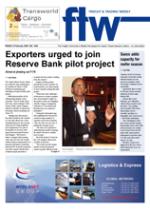The issue of possible pricefixing
in the international
forwarding community,
following major such charges
being laid against global
air carriers and huge fines
resulting, has again taken a
more central stage in SA.
Newspaper headlines have
recently been emblazoned with
government declaring war on
what it terms “greedy cartels”
conducting anti-competitive
practices – and threatening jail
for the executives responsible.
In the latest onslaught, the
Competition Commission
(CC) opened an attack on
fuel giant Sasol, which has
applied for leniency before a
looming investigation into anticompetitive
practices in the
entire petroleum and gas
value chain.
One report added that
its fertiliser business, Sasol
Nitro, could also be fined
R350-million after it allegedly
violated South Africa's
competition laws.
This joins a host of other
industry areas which are being
investigated or have been
investigated – including dairy
and bread companies, banks,
steel makers and cell phone
companies.
It’s almost all triggered off
by whistle-blowing executives,
or companies themselves, all
looking for exemption from
prosecution.
And this was the case in the
CC’s high profile raids on a
number of SA’s multi-national
freight forwarders started in
October 2007 – where price
fixing for fuel and other
surcharges was under scrutiny.
While it was led by the
CC in this country, it was
conducted in conjunction with
the European Commission
(EC) and the US Department
of Justice.
This, according to the
CC’s spokeswoman of the
time, Mandi Mokoena, was
originally prompted by a
whistle-blower in the freight
industry who had contacted
the commission under the
conditions of the corporate
leniency policy (CLP).
And the CC’s suggestion at
the time was that changes to
this CLP should be designed to
make it an even more effective
tool in the fight against cartels,
which were seen as one of the
most serious contraventions of
the Competition Act.
The leniency programme
offers total or partial immunity
to cartel members assisting
the competition authorities in
identifying and prosecuting
cartels.
And the latest news is that
further major changes to the
act are currently awaiting the
signature of President Kgalema
Mothlanthe, and will mean that
directors or executives can be
jailed for up to 10 years or
fined up to R500 000 in their
personal capacity.
And where does the SA
forwarding industry stand in
this hot-bed of new legislation
aimed at anti-competitive
practices?
Still right in the middle,
according to Nelly Salenta,
head of the CC’s investigation.
“The SA investigation,
linked with the international
investigation, has revealed
quite a lot of information,”
she told FTW. “But no charges
have yet been laid.”
And it’s not being hurried,
she added.
“With these being extensive
multi-national operations, the
investigation can be
expected to take some time yet
to complete.”
New law punts jail time for price-fixing executives
06 Feb 2009 - by Alan Peat
0 Comments
FTW - 6 Feb 09

06 Feb 2009
06 Feb 2009
06 Feb 2009
06 Feb 2009
06 Feb 2009
06 Feb 2009
06 Feb 2009
06 Feb 2009
Border Beat
16 Apr 2025
Featured Jobs
New
New
